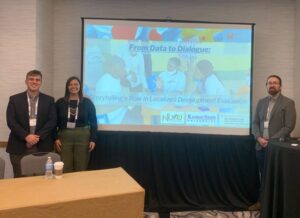 Ray Marshall Center’s Social Science Research Associate Thomas Boswell was part of a trio presenting findings from Nuru International‘s 2022 Nuru Nigeria Resilience Report at the American Evaluation Association‘s Evaluation 2023 conference in Indianapolis October 9-14, 2023. Boswell joined Nuru’s Ian Schwenke and Dena Bunnel of Kansas State University in the October 14th presentation. The report marks the end of a five-year evaluation conducted in partnership with the Center. The randomized controlled trial (RCT) evaluated communities in northeast Nigeria and seeks to understand how Nuru interventions impact community resilience. You can read Nuru’s October 5th press release here and view the presentation here. You can also read more about our partnership here.
Ray Marshall Center’s Social Science Research Associate Thomas Boswell was part of a trio presenting findings from Nuru International‘s 2022 Nuru Nigeria Resilience Report at the American Evaluation Association‘s Evaluation 2023 conference in Indianapolis October 9-14, 2023. Boswell joined Nuru’s Ian Schwenke and Dena Bunnel of Kansas State University in the October 14th presentation. The report marks the end of a five-year evaluation conducted in partnership with the Center. The randomized controlled trial (RCT) evaluated communities in northeast Nigeria and seeks to understand how Nuru interventions impact community resilience. You can read Nuru’s October 5th press release here and view the presentation here. You can also read more about our partnership here.
Self-Sufficiency Wage Data Study
| Principal Investigators: | Greg Cumpton, PhD |
| Sponsor: | Texas Workforce Commission |
| Project Duration: | May 2023 – December 2026 |
| Description: | Pursuant to the Texas Workforce Commission’s (TWC) duties under Government Code, Chapter 2308A (enacted in House Bill 3767, 87th Legislature), the TWC has entered a partnership with the Ray Marshall Center (RMC) to implement its duty to establish a self-sufficiency wage for each Texas county. RMC will study Texas family compositions and suggest improvements, and study current labor market conditions and how it relates to the Self-Sufficiency Wage. |
| Reports Available: |
AT Home Initiative Evaluation
| Principal Investigators: | Greg Cumpton, PhD |
| Sponsor: | Ending Community Homelessness Coalition (ECHO) |
| Project Duration: | March 2023 – December 2027 |
| Description: | In coordination with ECHO, the Ray Marshall Center (RMC) will execute the planning and preparation needed to conduct the evaluation of the AT Home Initiative. |
| Reports Available: |
Child Care Market Rate/Cost of Quality Studies
| Principal Investigators: | Daniel G. Schroeder, PhD (Principal Investigator) – Ray Marshall Center Monica Faulkner (Principal Investigator), Laura Marra (Co-Principal Investigator) – Texas Institute for Child and Family Wellbeing |
| Sponsor: | Texas Workforce Commission |
| Project Duration: | July 2022 – June 2024 |
| Description: | Researchers at The University of Texas at Austin will provide services in order to complete two annual studies for the Texas Workforce Commission. The Texas Institute for Child and Family Wellbeing at the Steve Hicks School of Social Work will manage data collection from child care providers. The Ray Marshall Center at the LBJ School of Public Affairs manages the data analysis and reporting.
The purpose of the Child Care Market Rate Study is to create statistical summaries of market rates for child care for the entire state of Texas and for each of the 28 Local Workforce Development Areas. The purpose of the Cost of Quality Study is to understand the cost of providing quality child care in the state of Texas. The purpose is to provide estimates of how much more additional funding, in terms of daily rates, should be paid to providers who meet quality standards to care for children, relative to how much providers who meet minimal standards are paid. |
| Reports Available: | The reports for this project are published through the Texas Institute for Child & Family Wellbeing at the University of Texas at Austin’s Steve Hicks School of Social Work. The following reports are available on their website. |
Hire Local Evaluation
| Principal Investigator: | Greg Cumpton, PhD |
| Sponsor: | Workforce Solutions Capital Area |
| Project Duration: | April 2022 – December 2023 |
| Description: | The Ray Marshall Center has partnered with Workforce Solutions Capital Area to provide services to collect, analyze, and report data outcomes under the Hire Local Plan. |
| Reports Available: |
Maximizing Impact and Measuring Success
| Principal Investigator: | Greg Cumpton, PhD |
| Sponsor: | Goodwill Industries of Central Texas |
| Project Duration: | April 2021 – November 2021 |
| Description: | The Ray Marshall Center will provide assistance to Goodwill Industries of Central Texas to develop, plan, and deploy a revised strategic plan for future years. |
| Reports Available: |
Researching ACC’s Rainy Day Savings Program
| Principal Investigator: | Greg Cumpton, PhD |
| Sponsor: | Austin Community College |
| Project Duration: | April 2021 – March 2022 |
| Description: | Austin Community College’s (ACC) Student Money Management Office (SMMO), established in 2016, supports Austin Community College student success by providing accessible and relevant money management education, enabling students to make informed financial decisions.
In fall 2018, SMMO piloted the Rainy Day Savings Program, modeled after the successes of Individual Development Accounts (IDAs) which have helped low-income people save and attain assets. In the Rainy Day Savings program, students earn up to $100 in cash incentives for completing certain tasks and meeting milestones. These tasks and milestones were chosen because of their potential impact on future financial wellness, such as setting up direct deposit, completing the Free Application for Federal Student Aid (FAFSA), and meeting with a financial coach. Savings accounts were opened for students at University Federal Credit Union (UFCU) exclusively for the purposes of the Rainy Day Savings Program, and students worked towards amassing at least $500 savings. Based on the initial results, ACC viewed this program as a tool to increase student retention and completion and sought to expand and refine the program. ACC received funding from Trellis Foundation in January 2020 to support this effort. ACC enrolled approximately 600 students in the Rainy Day Savings Program in fall 2020. Enrollment focused on two key student groups: First-time in college (FTIC) and Adult Education (AE) students. The program helped students establish a savings account at a local financial institution and provided cash incentives as they set aside money for a financial emergency. ACC is partnering with the Ray Marshall Center (RMC) to study the effectiveness of the Rainy Day Savings program. This research study will provide actionable information about the success of the intervention allowing for ACC and Trellis to make decisions about and program modifications and sustainability. |
| Reports Available: | Research Study of Austin Community College’s Rainy Day Savings Program: Year One Report Authors: Ashweeta Patnaik and Greg Cumpton Date: April 2022 Publication Type: Report, 38pp. Research Study of Austin Community College’s Rainy Day Savings Program Date: August 2021 Publication Type: Report, 28pp. |
Applied Data Analysis Training and Support
| Principal Investigator: | Heath J. Prince, PhD |
| Sponsor: | Coleridge Initiative, Inc. |
| Project Duration: | April 2021 – January 2022 |
| Description: | The Ray Marshall Center (RMC) will provide data management, research, and governance assistance to the Texas Workforce Commission (TWC). As a part of an initiative at the Coleridge Initiative, Inc. to expand access to state data to policymakers and state agency employees, the RMC will provide staffing and support to facilitate the Applied Data Analytics training program created by the Coleridge Initiative, Inc. The RMC will provide support and staffing to implement the training developed by the Coleridge Initiative for state agencies in Texas and surrounding states. The curriculum is designed to expand access and use of administrative data to inform policy. This training model is designed to be repeated in support of data initiatives within Texas after this engagement.
The Coleridge Initiative is a not-for-profit start-up, originally established at New York University’s Center for Urban Science and Progress. The Coleridge Initiative became fully independent in August 2020. The Coleridge Initiative works with government agencies to break down the barriers to accessing confidential data. They set up and manage a secure computational research platform, the Administrative Data Research Facility (ADRF), to promote access to sensitive and confidential microdata (fully secure and de-identified of course). They then train analysts and researchers how to access and use this data. The Initiative has already worked with over 100 federal, state, and local agencies and trained over 500 agency staff. |
| Reports Available: |
Data Linkage for LEO’s Texas Research Study
| Principal Investigator: | Ashweeta Patnaik, MPH |
| Sponsor: | Wilson Sheehan Lab for Economic Opportunities, University of Notre Dame |
| Project Duration: | June 2021 – June 2023 |
| Description: | The Wilson Sheehan Lab for Economic Opportunities (LEO) at the University of Notre Dame conducts impact evaluations in partnership with non-profit and government agencies focused on reducing poverty by creating evidence based programs that move people from poverty to self-sufficiency. LEO is currently conducting a large research study in Texas to test assumptions about self-sufficiency programs. The research examines the impact of multiple self-sufficiency programs being implemented in locations across the state of Texas. Partners include Catholic Charities of Galveston-Houston, the Goodwill Excel Center in Austin, Catholic Charities of Dallas, Jewish Family Services, NPower, Combined Arms, and Lubbock County, and the Tarrant County Homeless Coalition. This research will help in understanding the impact of anti-poverty programs on populations ranging from school age children, to elderly, to veterans to people and families at low-income levels.
LEO is partnering with the Ray Marshall Center (RMC) at The University of Texas at Austin to utilize state administrative data to support this research. LEO and RMC researchers will use the data to demonstrate the impact of these self-sufficiency programs on outcomes such as earnings, employment and public benefit usage. By testing what works to move people to self-sufficiency, LEO and RMC will inform and improve poverty programming across the state and inform policymakers as they make decisions about funding and programming. |
| Reports Available: |
Nuru Ethiopia, Nuru Kenya, and Nuru Nigeria Impact
| Principal Investigator: | Heath J. Prince, PhD |
| Sponsor: | Nuru International |
| Project Duration: | April 2021 – February 2024 |
| Description: | The Ray Marshall Center will assist Nuru International’s M&E team with analyzing and reporting Nuru Ethiopia, Nuru Kenya, and Nuru Nigeria’s impact. |
| Reports Available: | Nuru Kenya 2023 Dairy Impact Brief Authors: Heath Prince and Thomas Boswell (Ray Marshall Center); Fatuma Nyanjong (Nuru Kenya); and Casey Harrison, Matt Lineal, Ian Schwenke, and Bethany Ibrahim (Nuru International) Date: December 2023 Publication Type: Research Brief, 6pp. This report is commissioned by Nuru International Nuru Nigeria 2023 Endline Impact Report Nuru Ethiopia 2022 Impact Report Nuru Kenya 2022 Dairy Report Nuru Ethiopia 2021 Impact Report Nuru Nigeria 2022 Short-Term Impacts Nuru Nigeria: 2021 Midpoint Impact Report 2019 Nuru Nigeria Baseline Report |
- 1
- 2
- 3
- …
- 5
- Next Page »


